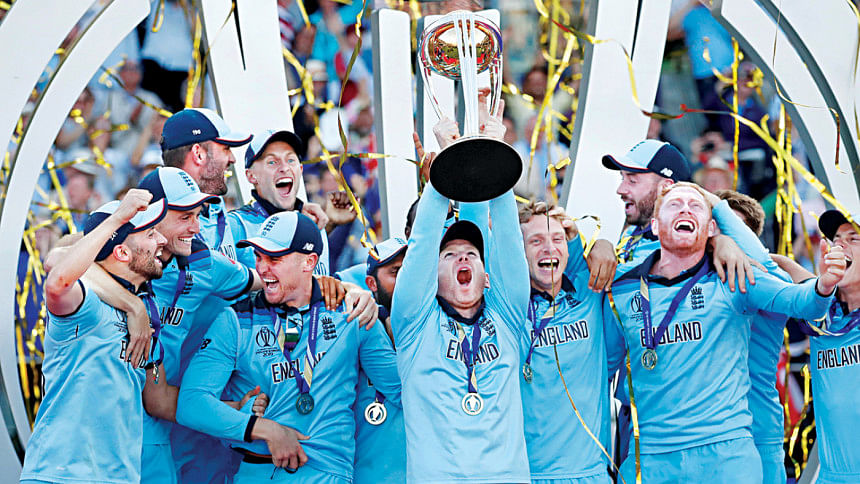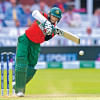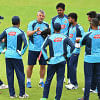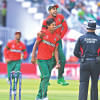England’s cup of joy at last

Martin Guptill played a full ball on leg stump from Jofra Archer to deep midwicket. Two runs were needed off the last ball of the Super Over and he put in a desperate dive -- the second fateful one in less than half an hour -- to complete the second, but there was too much ground between his bat and the World Cup trophy calling to him from just beyond the crease. Jos Buttler gathered the throw, which was well wide of the stumps, but there was enough time to whip the bails off, which he did and started running towards the gallery in ecstasy, followed by his teammates and fuelled by possibly the loudest roar ever heard at Lord’s.
England had won their first ever World Cup, had won it at home -- the third successive home victory in World Cups after India’s in 2011 and Australia’s in 2015.
But runs could not separate New Zealand and England in the greatest World Cup final yesterday, even though the teams had two chances to get ahead. The match saw two ties -- one in normal play and one in the Super Over. Buttler celebrated immediately because he knew that England, having hit more boundaries -- 22 fours and two sixes to New Zealand’s 14 fours and two sixes -- in the 50-over portion, had edged the tie-breaker to a tie-breaker.
England had sent Jos Buttler and Ben Stokes -- the man who made the Super Over possible with his last-over heroics -- and the duo hit two boundaries while scoring 15 runs off Trent Boult, who nearly defended 14 runs in the last over of normal time.
The pacey Jofra Archer came in to bowl for England and New Zealand had nominated Jimmy Neesham and Guptill to score the 16 runs that would give them their first World Cup. Archer started with a wide, conceded two the next ball and Neesham hammered a six off the third ball. With seven required off four balls Neesham scampered a pair of doubles before getting just a single off the penultimate ball. That set the stage for the last ball, after which there was heartbreak for New Zealand and elation for most of the 30,000 gathered at Lord’s.
Before the high-octane two-over finish, there was a pulsating 100-over contest that led up to that point. New Zealand bowled brilliantly to defend 241 for eight, and England’s Ben Stokes hit a nearly perfectly-paced 98-ball 84 to take England level after they were at one stage 86 for four.
It was nearly perfectly paced because he needed fortune to end up as the player-of-the-match. There was another despairing dive before Guptill’s, this one during the last over of normal play when England needed nine runs from three balls. Stokes, having just hit a six after playing two dot balls from Trent Boult, whipped a ball away to deep midwicket and dove to beat the throw -- from none other than Guptill -- and the ball deflected off the bat and ran away for four. That effectively brought six runs from the fourth ball. With three more required from the last two balls, Adil Rashid was run out at the non-striker’s end after Stokes had hit to long off. With two more needed off the last ball, last man Mark Wood was run out trying to take the match-winning second, bringing on the Super Over in a World Cup final that will go down in folklore as one of the greatest matches -- let alone World Cup finals -- ever played.
Before that, Buttler and Stokes had put on 110 runs for the fifth wicket to fish England out of trouble. Buttler was the dominant partner, scoring 59 off 60 balls. When the last 10 overs started England needed 72 runs with Buttler and Stokes at the crease. But that is when the Kiwis started turning it around as Jimmy Neesham and Lockie Ferguson bowled to their fields and dried up the boundaries. Buttler departed in the 45th over with 45 still left to win, caught in the deep off Ferguson trying to re-lease the pressure. Chris Woakes departed for 10 in the 47th over, caught behind off a fiery Ferguson. England needed 24 off the last two overs. Liam Plunkett holed out off Jimmy Neesham, caught at long off by Boult. In another stroke of luck for Stokes, Boult nearly pulled off a stunner off the fourth ball of the over when he caught the ball at the boundary, but his feet had touched the ropes before he could throw it back for a combination catch. Neesham then accounted for Jofra Archer, bowling him for a first-ball duck with a slower ball. With two wickets left and 15 runs to get, it seemed New Zealand’s match, but that is when the match turned from a classic to a thriller of epic proportions.
Earlier, the crunch battle was England’s belligerent opening pair of Jason Roy and Jonny Bairstow taking on New Zealand’s incisive new-ball duo of Trent Boult and Matt Henry.
The left-handed Boult almost accounted for Roy in the very first ball of the innings, rapping the right-hander with a sharp inswinger that seemed headed for the stumps. New Zealand reviewed the not-out decision, but the decision stayed with the umpire as just a part of the ball was hitting leg stump.
While New Zealand brought Test-match ethos by trying for wickets with early movement, Roy repre-sented England’s limited-overs motto by going hard at anything that was slightly off line or length. He hit three boundaries in that process, but Henry also had him playing and missing on numerous occasions with perfectly pitched outswingers. Eventually, Roy got close enough to one of those and edged through to the keeper in the sixth over with the score on 28.
If New Zealand’s bowling was in Test-match mode, their fielding was very much of the cutting-edge limited-overs variety, scampering after every ball and throwing themselves at every ball to support Boult, Henry, the pacey Lockie Ferguson and the variety-laden Colin de Grandhomme. Roy’s dismissal saw just 31 runs in the next 65 balls and it was the pressure built up through that concerted effort that induced Joe Root to go for an airy drive and edge behind to the keeper in the 17th over off de Grandhomme.
Bairstow departed next when he played on to a fast Ferguson lifter in the 20th over with the score reading 71 for three and the required run rate nudging six an over. That set the stage for New Zealand’s comparative weak link of Jimmy Neesham to come on and England skipper Eoin Morgan, perhaps trying to release the pressure, went early at a long hop off the first delivery and Ferguson took a superb catch running in from deep point and diving forward to send Morgan on his way.
Earlier still, ages ago it seemed by the end of the match, New Zealand were restricted to 241 for eight by a strong bowling performance from England. Liam Plunkett took three for 42 and Chris Woakes three for 37 as England successfully managed to deny New Zealand’s danger men Kane Williamson and Ross Taylor meaningful contributions, which they had done throughout the World Cup. Opener Henry Nicholls top-scored with 55. Even after Taylor and Williamson’s departures, New Zealand played within their means and concentrated on getting just enough runs on the board to put pressure on England in the biggest match of their lives in front of a partisan crowd. They put faith in their bowling lineup to dial up that pressure, and that is exactly what they did.
At the end, however, England proved equal to the task and their boundary count, and a stray deflection, saw them crowned champions at home.

 For all latest news, follow The Daily Star's Google News channel.
For all latest news, follow The Daily Star's Google News channel. 








Comments